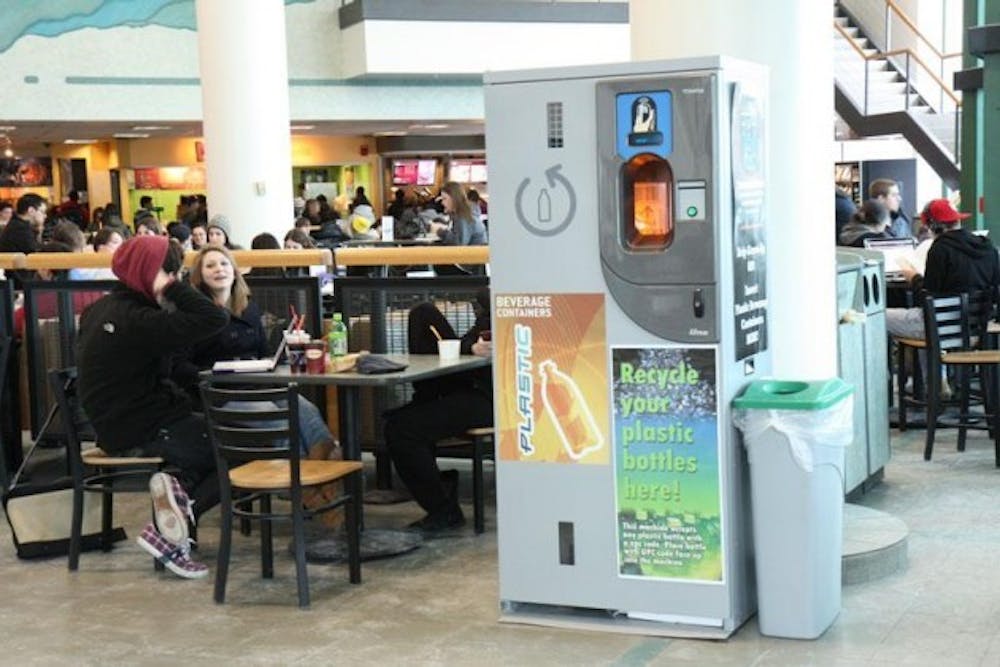Students casually fling their water bottles into the trash can, barely missing the plastic bottle bin only two inches away. Discarded handouts and flyers advertising campus events litter lecture halls and hallways.
UB recycles nearly 30 percent of its waste flow every year. With thousands of people on each campus, students have the power to help UB go green by simply recycling and reusing. The Student Association's environmental department is trying to promote that idea this semester with many different events.
The environmental department is participating in RecycleMania, a nationwide recycling competition, this semester. This competition is a way for the 64 SUNY schools and 607 other colleges across the nation to help the environment by recycling and producing less waste.
In previous years, the competition helped to generate 84.5 million pounds of recycled products. Charts are posted across campus showing where UB ranks among other colleges and the amount of recycled goods it has produced. So far, UB's weekly recycling rate is 31.72 percent, beating the university's highest record of last year (23.35 percent).
"Recycling is a pretty big issue and we definitely want to work on that," said Emily Gibson, a junior communication and economics major and student representative for the communications and outreach environmental stewardship committee. "We are trying to drive home the RecycleMania to increase recycling across campus."
During the RecycleMania Campaign, members of the environmental department will be walking around campus handing out prizes such as T-shirts, gift cards and water bottles to students who get "caught green-handed" by recycling or refilling reusable water bottles.
The Sustainability Bazaar, scheduled for late March or early April, will feature local businesses and not-for-profit organizations that promote sustainability. Many of these organizations are environmentally friendly or sell green products and technology. The purpose of the bazaar is to promote awareness of the many different ways that students can help out the environment.
On April 2 at 11 a.m., the environmental department will be hosting a bike ride for students. The ride will be from North Campus to South Campus, and will act to promote environmentally friendly transportation. Local bike shops will be present to lend bikes to students who do not own one. For those students in need of some bike tune-ups, free minor bike repairs will be given out along with free food and prizes.
Additionally, the environmental department will be sending representatives and interested students to Power Shift, a nationwide conference in Washington D.C. that focuses on local, regional, and national environmental action. This year's conference will focus on a national shift to clean energy, an economy based on green jobs, and more sustainable college campuses.
Transportation will be provided for those interested in attending the weekend-long conference from April 15 until April 18. More details will be provided closer to the event date. For more information regarding the conference itself, visit powershift2011.org.
"We want students that haven't really been involved in environmental work here to come down to Power Shift because we want to open this up to a lot of people," said Paul Stephan, a sophomore psychology major and the climate neutrality director in the SA environmental department. "Environmental leaders on college campuses get together and talk about how they can push for reforms on their campuses."
For those students wanting to be more environmentally friendly in their own lives, there are many simple ways to help. According to Gibson, turning off the lights when leaving a room and unplugging electronics when not in use are major steps. Better known as "vampire power," many students tend to leave their appliances plugged in all the time, sucking out wasted power.
Another way to be more environmentally savvy is by means of a reusable water bottle. Located between Knox Hall and the Student Union near the ATMs is a water fountain equipped with an easier way to refill water bottles. It also has a digital tally to show the amount of water bottles that UB students have saved, which has added up to 29,793 thus far.
Gibson also advises riding bikes instead of always driving, taking the bus or car-pooling, and lowering thermostats. Another idea is to eat more local or organic foods, which tend to travel shorter distances to get here and use less pesticides and preservatives that are harmful to the environment and the body.
"These tips save you money, so you're helping yourself as well as the environment," Gibson said. "Even though organic food can sometimes be a little bit more expensive, it's healthier for you because you are not ingesting the chemicals that are harmful to your body."
As for those groups on campus whose flyers are littered across the lecture halls and campus floors, events could be advertised by use of Facebook groups, digital invitations, websites, or UB's radio station WRUB, among many other options.
E-mail: features@ubspectrum.com





